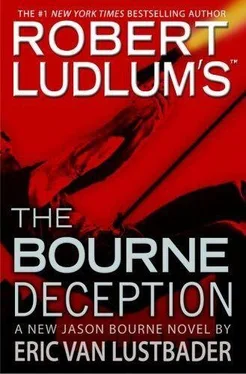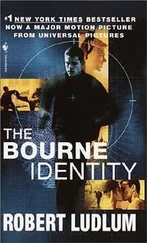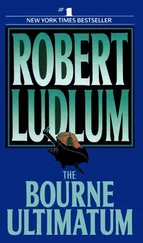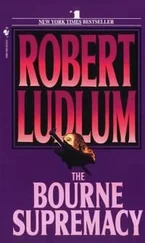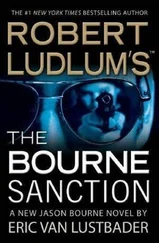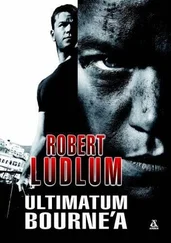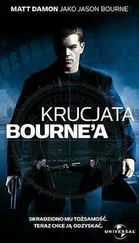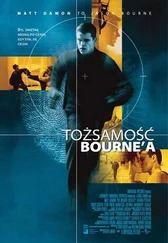Robert Ludlum - Bourne 7 – The Bourne Deception
Здесь есть возможность читать онлайн «Robert Ludlum - Bourne 7 – The Bourne Deception» весь текст электронной книги совершенно бесплатно (целиком полную версию без сокращений). В некоторых случаях можно слушать аудио, скачать через торрент в формате fb2 и присутствует краткое содержание. Жанр: Триллер, на английском языке. Описание произведения, (предисловие) а так же отзывы посетителей доступны на портале библиотеки ЛибКат.
- Название:Bourne 7 – The Bourne Deception
- Автор:
- Жанр:
- Год:неизвестен
- ISBN:нет данных
- Рейтинг книги:4 / 5. Голосов: 1
-
Избранное:Добавить в избранное
- Отзывы:
-
Ваша оценка:
- 80
- 1
- 2
- 3
- 4
- 5
Bourne 7 – The Bourne Deception: краткое содержание, описание и аннотация
Предлагаем к чтению аннотацию, описание, краткое содержание или предисловие (зависит от того, что написал сам автор книги «Bourne 7 – The Bourne Deception»). Если вы не нашли необходимую информацию о книге — напишите в комментариях, мы постараемся отыскать её.
Bourne 7 – The Bourne Deception — читать онлайн бесплатно полную книгу (весь текст) целиком
Ниже представлен текст книги, разбитый по страницам. Система сохранения места последней прочитанной страницы, позволяет с удобством читать онлайн бесплатно книгу «Bourne 7 – The Bourne Deception», без необходимости каждый раз заново искать на чём Вы остановились. Поставьте закладку, и сможете в любой момент перейти на страницу, на которой закончили чтение.
Интервал:
Закладка:
There were only lonely sounds in Nizhny Tagil, or else frightening, like the faraway hoot of the train whistle echoing off the Ural Mountains or the sudden shriek of one of the prison sirens; like the wail of a child lost in the filthy streets or the wet snap of bones breaking during a drunken brawl.
As Arkadin sought to evade the armada of gang members fanning out through the streets and slums of the city, he learned to follow the yellow curs slinking through shadowed alleyways, their tails curled between their legs. Then quite suddenly he ran across two men canvassing the very same network of exhausted backwaters that a moment before had seemed safe enough. Turning, he let them believe they were running him down. As he turned a corner, he snatched up a piece of splintered wood, part of a discarded bed set, and, crouching down, slammed it across the lead man‘s legs. The man shouted, toppling forward. Arkadin was prepared, grabbing hold of him, pitching him down so that his face slammed into the filthy concrete. The second man was on him, but Arkadin drove a cocked elbow into his Adam‘s apple. As the man began to choke, Arkadin wrested the pistol from his hand and shot him point-blank. Then he turned the gun on the first man and put a bullet through the back of his head.
From that moment on he knew the streets were too dangerous for him; he needed to find a sanctuary. He thought of getting himself arrested and thrown into one of the nearby prisons as a way of protecting himself, but quickly discarded the notion. What might have worked in another part of the country was out of the question in Nizhny Tagil, where the cops were so corrupt it was often impossible to distinguish them from the city‘s criminals. Not that he was out of ideas; far from it. His experiences thus far had made clever thinking a way of life.
Continuing onward, he considered and rejected any number of possibilities, all of which were too public, too riddled with potential snitches who‘d be on the lookout for him in exchange for the promise of a bottle of real liquor or a night of free rutting with underage girls. Finally, he hit upon what he was certain was the perfect solution: He‘d hole up in the basement of his own building, where the gang and its maniacal new boss, Lev Antonin, were still headquartered. Lev Antonin‘s avowed goal was to find and destroy the murderer of the man he‘d succeeded. He wouldn‘t rest, wouldn‘t let his men rest until Arkadin‘s severed head was brought to him.
Because Arkadin was the one who had bought it during the acquisition phase of his real estate business, he was intimately familiar with every square inch of the building. He knew, for instance, that an updated sewage system had been planned for the building, started, but never completed. Through a long-vacant municipal lot overgrown with weeds and refuse, he entered this dank and disused symbol of his birth city, a repellent underground conduit that stank of decomposition and death, emerging at length into the cavernous bowels of the building. He would have laughed at how easily this was accomplished had he not been acutely aware of his plight. He was a prisoner of the one place he wanted most desperately to leave.
The plane lurched sickeningly and Bourne woke with a start. Rain drummed hard against the Perspex window. He‘d dozed off, dreaming of the conversation he‘d had with Tracy Atherton, the young woman seated beside him. In his dream, they were talking about Holly Marie Moreau instead of Francisco Goya.
He had slept deeply and without dreaming during the twenty-three-plus-hour trip from Bali, first to Bangkok, then Madrid on Thai Air. This flight, from Madrid to Seville on Iberia, was the shortest one, but now it had turned miserable. Sudden air pockets within a lashing storm caused the plane to lurch and dip. Tracy Atherton went quiet and still, staring straight ahead while her complexion turned ashen. Bourne held her head while she vomited twice into the airsick bag he pulled from the seat back.
She was a whisper-thin blonde with large blue eyes and a smile that seemed to wrap around her face. Her teeth were white and even, her nails cut straight across, her only bits of jewelry a gold wedding band and diamond stud earrings, large enough to be expensive but small enough to be discreet. She wore a flame-colored blouse under a lightweight silver silk suit with a pencil skirt and tapered jacket.
— I work at the Prado in Madrid, she‘d said. -A private collector hired me to authenticate a recently unearthed Goya that I think is a fake.
— Why do you say that? he‘d asked.
— Because it‘s purported to be one of Goya‘s Black Paintings, done later in life when he was already deaf and going mad with encephalitis. There are fourteen in the series. This collector believes he owns the fifteenth. She shook her head. -Frankly, history isn‘t on his side.
As the weather calmed, she thanked Bourne and went off to the toilet to clean up.
He waited several seconds, then reached down, unzipped her slim attaché
case, and rifled through the contents. To her, he was Adam Stone, the name on the passport Willard had given him before he‘d left Dr. Firth‘s compound. According to the legend Willard had devised, he was a venture capitalist on his way to see a potential client in Seville. Ever mindful of the unknown assailant who‘d tried to kill him, he was wary of anyone sitting next to him, anyone striking up a conversation with him, anyone wanting to know where he‘d been and where he was going.
Inside the attaché case were photos-some quite detailed-of the Goya painting, a horrific study of a man being drawn and quartered by four rearing, snorting stallions while army officers lounged around, smoking, laughing, and playfully poking the victim with their bayonets.
Along with these photos was a set of X-rays, also of the painting, accompanied by a letter authenticating the painting as a genuine Goya, signed by a Professor Alonzo Pecunia Zuiga, a Goya specialist at the Museo del Prado in Madrid. With nothing else of interest, Bourne returned the sheets to the attaché case and rezipped it. Why had the woman lied to him about not knowing if the painting was a genuine Goya? Why had she lied about working for the Prado when, in his letter, Zuigaaddressed her as an outsider, not as an esteemed colleague of the museum? He‘d find out soon enough.
He stared out the window at the infinity of gray-white, turned his mind to his quarry. He‘d used Firth‘s computer to gather information on Don Fernando Hererra. For one thing, Hererra was Colombian, not Spanish. Born in Bogotá in 1946, the youngest child of four, he was shipped off to England for university studies, where he took a First in economics at Oxford. Then, inexplicably, for a time his life took another path entirely. He worked as a petrolero for the Tropical Oil Company, working his way up to cuńero -a pipe capper-and beyond, moving from camp to camp, each time raising the output of barrels per day. Ever restless, he pushed on, buying a camp dirt-cheap because Tropical Oil‘s experts were certain it was in decline. Sure enough, he turned it around and, within three years, sold it back to Tropical Oil for a tenfold profit.
That‘s when he got into venture capital, using his outsize profits to move into the more stable banking sector. He bought a small regional bank in Bogotá, which had been on the verge of failing, changed its name, and spent the decade of the 1990s building it into a national powerhouse. He expanded into Brazil, Argentina, and, more recently, Spain. Two years ago he‘d vigorously resisted a buyout by Banco Santander, preferring to remain his own master. Now his Aguardiente Bancorp, named after the fiery local licoriceflavored liquor of his native country, had more than twenty branches, the last one opening five months before in London where, increasingly, all the international action was.
Читать дальшеИнтервал:
Закладка:
Похожие книги на «Bourne 7 – The Bourne Deception»
Представляем Вашему вниманию похожие книги на «Bourne 7 – The Bourne Deception» списком для выбора. Мы отобрали схожую по названию и смыслу литературу в надежде предоставить читателям больше вариантов отыскать новые, интересные, ещё непрочитанные произведения.
Обсуждение, отзывы о книге «Bourne 7 – The Bourne Deception» и просто собственные мнения читателей. Оставьте ваши комментарии, напишите, что Вы думаете о произведении, его смысле или главных героях. Укажите что конкретно понравилось, а что нет, и почему Вы так считаете.
